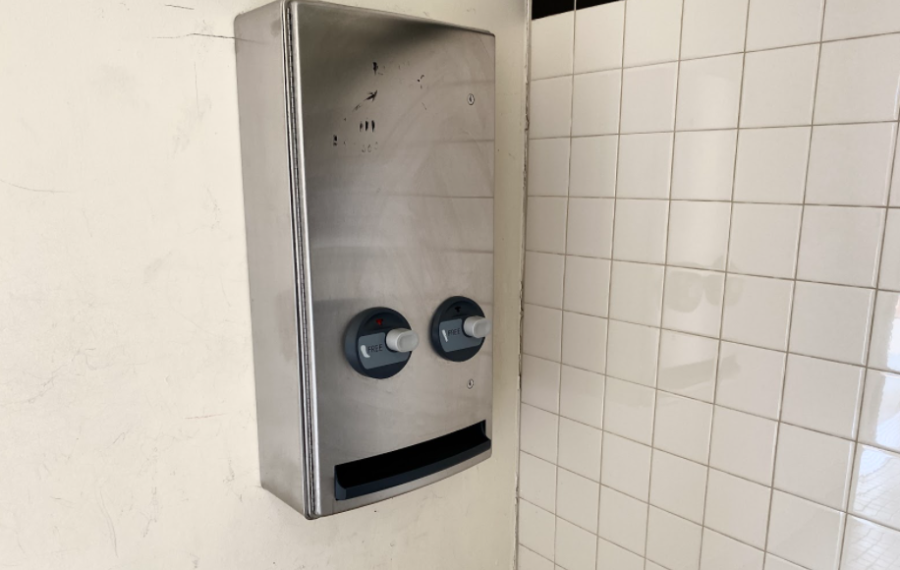Menstrual Equity for All Act will guarantee free feminine products available in campus restrooms
A feminine hygiene product dispenser hangs empty in the F-2 building girl’s bathroom. For years, it has stayed in its same vacant condition, but by next school year, it will be filled, along with others that will be built before the start of the 2022-23 school year. On Oct. 8, Governor Gavin Newsom signed the Menstrual Equity for All Act of 2021, requiring California public schools from grades 6-12, the University of California, the California State Universities and the community college districts of California to stock all women, all all-gender restrooms and at least one male restroom with an adequate supply of free menstrual products on or before the start of the 2022-23 school year.
The law expands on a previous law, which held that only 6-12 grade public schools with a 40% poverty pupil poverty threshold were required to stock 50% of the schools’ restrooms with feminine hygiene products.
In Section 1 of the Menstrual Equity for All Act of 2021, the California Government Addresses its means for expanding the previous law, including a discussion of equality.
The act states: “It is the intent of the legislature that this act provides for the health, dignity, and safety of menstruating students at every socioeconomic level, normalize menstruation among all genders, and foster gender competency in California schools, colleges, and universities.”
Looking closely at the details, the law states that the Menstrual Equity for All Act is a state-mandated program. It is not a funded mandate, leaving school districts with the responsibility to purchase and provide menstrual products on their own. Principal Mr. Justin Cutts is aware of the implications, but said he is unsure of how the Rocklin Unified School District will receive the products.
“There is no money attached to the mandate, so whether the bill is unfunded or funded, we are required to comply with it; and if we don’t follow it, there will be consequences,” Cutts said. “But, I assume access to [products] will run through our maintenance and operations staff at the district.”
But, while not much is known yet about how the law will be implemented on campus, Cutts believes that it was a good decision.
“When you look at it from an equity standpoint, I think it’s a great thing. It is always the details of how to do it and how to adjust the requirements to our individual school that will end up making the law effective,” Cutts said. “Once implemented, all we can do is adjust to our individual needs and discretion.”
Although she believes that free menstrual products should have been required all along, Camden Winton is looking forward to how the law will affect women in California.
“The new law is definitely a step forward for women,” Winton said. “It’s important for girls to have access to free products, especially for younger girls that get it for the first time, as well as girls that get it at unsuspecting times with no products with them. Personally, it would make me a lot less nervous going to school knowing that there are tampons and pads available to me in the bathrooms just in case I need them. it’s also nice knowing that myself and other girls in public schools are being thought about; it’s a great change for the future.”
Alice Jeon agrees, also believing that free menstrual products should have always been required.
“It’s great that we’re slowly progressing towards free menstrual products for women,” Jeon said. “[The law] will help all students at our school who do menstruate and especially those who do not have access to the products for whatever personal reasons. Menstrual products can be difficult to obtain for lots of women, so this is amazing.”
After the recent surge in “devious licks” in which students have been trashing and stealing supplies from the bathrooms on campus, health teacher Mrs. Jennifer Henry foresees issues with campus cleanliness once the law goes into effect next school year.
“I can imagine, especially after this year, that there would be a mess,” Henry said. “I don’t think it is a bad law, especially in low-income districts where access to menstrual products can be a challenge. But just like we have masks dropped throughout campus, I can only imagine what would happen once we implement the law.”
Cutts, although agrees with the benefits of the new law, also foresees issues regarding cleanliness.
Cutts said, “My biggest concern is the bathrooms being trashed again, but it is obviously a good thing for our students. There has to be responsibility and maturity that comes with it.”









